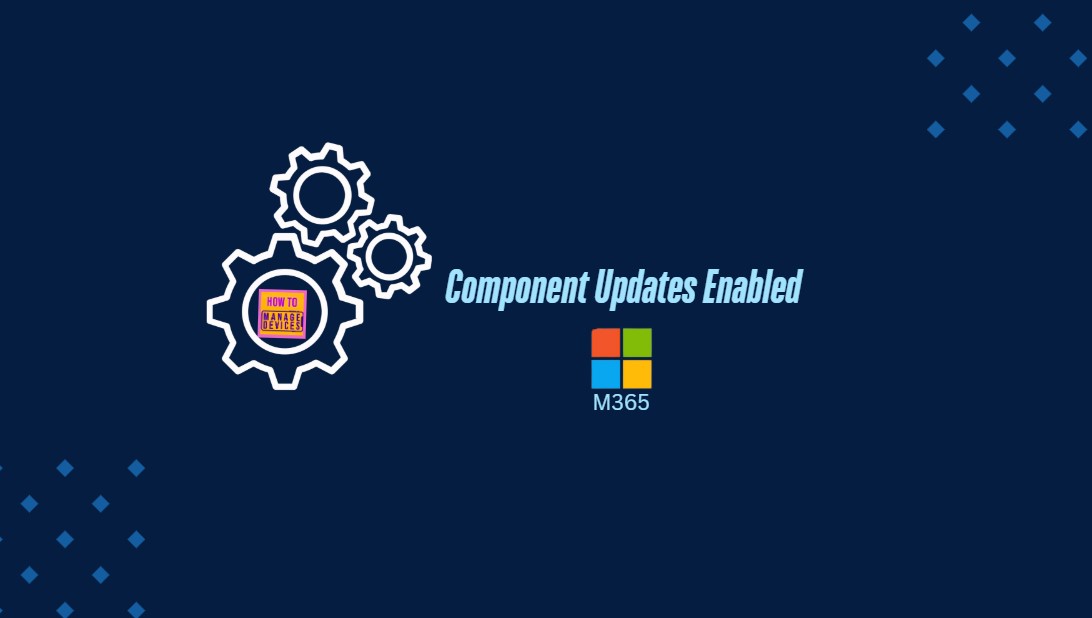Hey there, let’s discuss about enable or disable component updates policy in Edge browser using M365 Admin Center. Microsoft 365 is the new name for Office 365, providing the same applications, services, and security for both work and personal use.
The Component Updates Enabled policy in Microsoft Intune plays a crucial role in managing Microsoft Edge’s seamless functionality by controlling its ability to automatically refresh and upgrade its browser components.
This policy ensures that users benefit from the latest features, security enhancements, and performance improvements, keeping the browser both efficient and secure in a constantly evolving digital landscape. A component update improves or patches a single segment of a broader software application.
Through this blog post, we will see how to enable or disable the policy, Component Updates Enabled Policy in Edge Browser using M365 Admin center. Here we will get step by step guidance on how to deploy this policy in Edge.
Table of Contents
What are Component Updates?

Component updates are modifications made to individual software modules within a larger system. It enhances or fixes specific parts of a software program without altering the entire system.
Enable or Disable Component Updates Policy in Edge Browser
Component updates enabled policy help improve performance, security, and functionality while minimizing disruptions. First we need to login in to Microsoft 365 admin center > Settings > Microsoft Edge > Configuration Policies > Create Policy.

- How to Configure Auto Import At First Run Policy in Edge Browser using M365 Admin Center
- Enable or Disable Microsoft Editor Synonyms Policy in Edge Browser using M365 Admin Center
- M365 Copilot Now Available for All Introducing the Free Copilot Chat License and Consumption Offering
Basics
We need to provide a Name for our policy in the Basics settings, which is a required field. Also add an optional Description to help us easily identify and understand the policy’s purpose later. Additionally, this section displays the Policy Type and the Platform for which the policy is being created.

Settings
To add settings, simply click the +Add Settings button. This allows us to choose from a range of options to tailor the policy to our organization’s needs. We can refer the screenshot below.

Configure a Setting
Here we need to search our policy by the policy name. Then a value tab will open. On the Value tab, we have the option to enable or disable the selected policy. In this case, we can chose the Enabled option because the purpose of our policy is to activate a specific feature. If our goal is to deactivate the feature instead, we can select the Disabled option.
| Enable | Disable |
|---|---|
| If you enable or don’t configure this policy, component updates are enabled in Microsoft Edge. | If you disable this policy or set it to false, component updates are disabled for all components in Microsoft Edge. |

On the More Details tab,it gives us a deeper understanding of how the policy works. Once we click the Select button, a notification will appear to confirm that the policy has been successfully updated.

After selecting the policy, our settings, including the policy chosen name and value, will appear on the Settings page. Here, we need to click on the checkbox near the Policy name and click on the Next button.

Extensions
If we want to include an extension, simply click the + Add extension button, or we can skip the Extensions section, as it is not a mandatory step for creating policies in the Microsoft 365 Admin Center.
- Next

Assignments
The Assignments tab allows us to specify the groups to which we want to apply the settings. To use this feature, click the +Select group option, choose a Microsoft Entra Group, and then click the Select button.
- Click Select

Review and Create
The final step is “Finish“, if any adjustments are needed, we can click the Back button to make changes. When we are satisfied with the configuration, click Review and Create to save our policy.

A success message confirming that the policy has been successfully created. The newly created policy will then appear in the Configuration Policies section.

Client-Side Verification
We can check the Client-Side Verification, go to Applications and Services Logs > Microsoft > Windows > Devicemanagement-Enterprise-Diagnostics-Provider > Admin to open it.
- The event ID 814 confirms that a string policy is applied to the devices.

Device and User Check-in Status
When we click on the policy, we can determine if it was successfully implemented. To verify the monitoring status, go to the device configuration and locate the policy you created.

Need Further Assistance or Have Technical Questions?
Join the LinkedIn Page and Telegram group to get the latest step-by-step guides and news updates. Join our Meetup Page to participate in User group meetings. Also, Join the WhatsApp Community to get the latest news on Microsoft Technologies. We are there on Reddit as well.
Author
Anoop C Nair has been Microsoft MVP for 10 consecutive years from 2015 onwards. He is a Workplace Solution Architect with more than 22+ years of experience in Workplace technologies. He is a Blogger, Speaker, and Local User Group Community leader. His primary focus is on Device Management technologies like SCCM and Intune. He writes about technologies like Intune, SCCM, Windows, Cloud PC, Windows, Entra, Microsoft Security, Career, etc.


